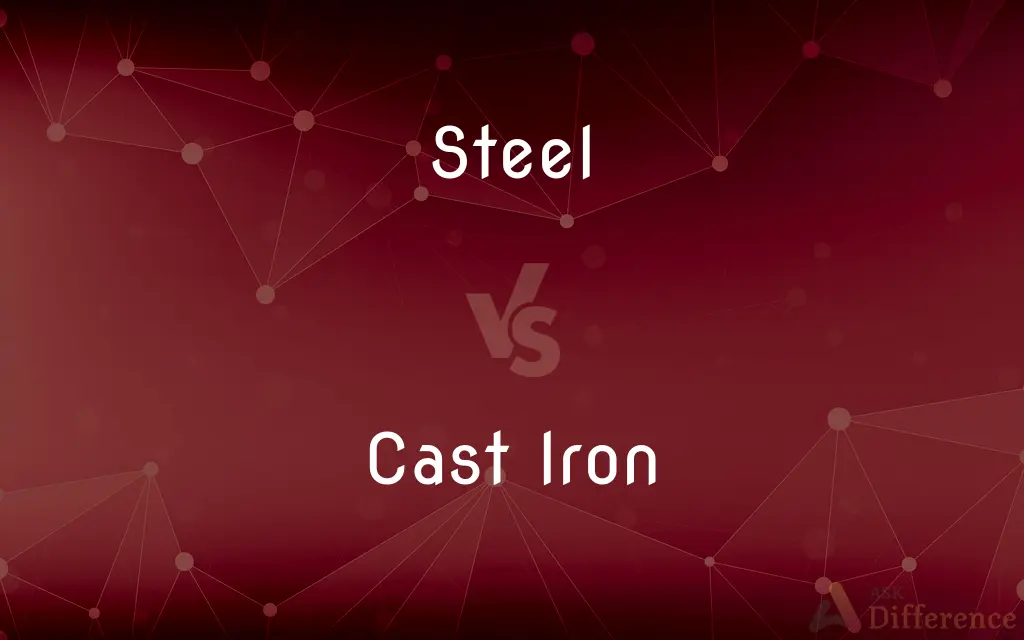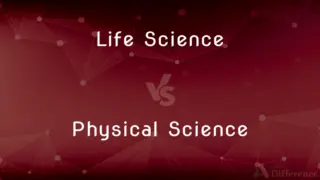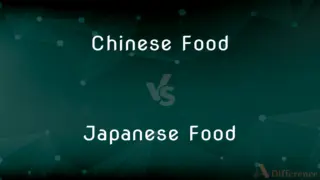Steel vs. Cast Iron — What's the Difference?
By Tayyaba Rehman — Published on November 15, 2023
Steel is an alloy primarily of iron and carbon with varying elements, known for its tensile strength. Cast Iron is a high-carbon iron alloy, brittle but excellent for heat retention.

Difference Between Steel and Cast Iron
Table of Contents
ADVERTISEMENT
Key Differences
Steel and Cast Iron, both primarily composed of iron, differentiate in carbon content and properties. Steel, an alloy combining iron and carbon, often includes other elements like manganese or nickel. This composition grants Steel its notable strength and malleability. In contrast, Cast Iron contains a higher percentage of carbon (typically 2%-4%), giving it its distinctive brittle nature.
Both Steel and Cast Iron find use across many industries, yet their applications differ significantly. Steel's strength, durability, and resistance to corrosion make it ideal for construction, automotive manufacturing, and various machinery. Cast Iron, due to its heat retention and even cooking properties, is favored for cookware like frying pans and Dutch ovens.
The processes for producing Steel and Cast Iron also differ. Steel is usually made from iron ore in blast furnaces, undergoing various treatments to control its carbon content and add other alloying elements. Cast Iron, with its high carbon content, solidifies directly from the liquid state to the final shape, bypassing the need to be worked or shaped.
Steel's versatility allows it to be made into different grades and types, like stainless steel or carbon steel, depending on the added elements and carbon levels. Cast Iron has several forms as well, such as white or gray iron, determined by the form of carbon present (graphite or iron carbide).
Comparison Chart
Composition
Alloy of iron, carbon, and other elements.
Iron alloy with 2%-4% carbon.
ADVERTISEMENT
Characteristics
Strong, malleable, less brittle.
Brittle, excellent heat retention.
Primary Use
Construction, automotive, machinery.
Cookware, machinery, architectural elements.
Production Process
Made from iron ore in blast furnaces.
Solidifies directly from the liquid state.
Types/Varieties
Stainless steel, carbon steel, etc.
White iron, gray iron, ductile iron, etc.
Compare with Definitions
Steel
A hard, strong metal used in construction.
Skyscrapers use steel for their framework.
Cast Iron
A high-carbon iron alloy.
The vintage skillet is made of cast iron.
Steel
A generally hard, strong, durable, malleable alloy of iron and carbon, usually containing between 0.2 and 1.5 percent carbon, often with other constituents such as manganese, chromium, nickel, molybdenum, copper, tungsten, cobalt, or silicon, depending on the desired alloy properties, and widely used as a structural material.
Cast Iron
A brittle form of iron, often used in cookware.
The cast iron pot retains heat long after being removed from the stove.
Steel
Something, such as a sword, that is made of steel.
Cast Iron
Metal known for its heat-retention properties.
Many chefs prefer cast iron pans for even cooking.
Steel
A quality suggestive of this alloy, especially a hard, unflinching character.
Cast Iron
An alloy favored for its characteristic black appearance.
The cast iron gate added a historic touch to the house.
Steel
Steel gray.
Cast Iron
Iron directly cast into shapes.
The garden features ornate cast iron benches.
Steel
Made with, relating to, or consisting of steel
Steel beams.
The steel industry.
A bicycle with a steel frame.
Cast Iron
Made of cast iron.
Steel
Very firm or strong
A steel grip.
Cast Iron
Rigid; inflexible
A cast-iron rule.
Steel
Of a steel gray.
Cast Iron
Exceptionally strong or resistant
A cast-iron stomach.
Steel
To cover, plate, edge, or point with steel.
Cast Iron
Alternative spelling of cast iron
Steel
To make hard, strong, or obdurate; strengthen
He steeled himself for disappointment.
Cast Iron
Alternative spelling of cast iron
Steel
An artificial metal produced from iron, harder and more elastic than elemental iron; used figuratively as a symbol of hardness.
Cast Iron
Made of cast iron. Hence, Fig.: like cast iron; hardy; unyielding.
Steel
(countable) Any item made of this metal, particularly including:
Cast Iron
Extremely robust;
An iron constitution
Steel
Bladed or pointed weapons, as swords, javelins, daggers.
Steel
A piece used for striking sparks from flint.
Steel
Armor.
Steel
A honing steel, a tool used to sharpen or hone metal blades.
Steel
(sewing) Pieces used to strengthen, support, or expand an item of clothing.
Steel
(dialectal) A flat iron.
Steel
A sewing needle; a knitting needle; a sharp metal stylus.
Steel
(printing) An engraving plate:
Steel
Projectiles.
Steel
(sewing) A fringe of beads or decoration of this metal.
Steel
A type of slide used while playing the steel guitar.
Steel
Medicinal consumption of this metal; chalybeate medicine; (eventually) any iron or iron-treated water consumed as a medical treatment.
Steel
(countable) Varieties of this metal.
Steel
The gray hue of this metal; steel-gray, or steel blue.
Steel
(figurative) Extreme hardness or resilience.
Steel
Made of steel.
Steel
Similar to steel in color, strength, or the like; steely.
Steel
(business) Of or belonging to the manufacture or trade in steel.
Steel
Containing steel.
Steel
(printing) Engraved on steel.
Steel
(transitive) To edge, cover, or point with steel.
Steel
(transitive) To harden or strengthen; to nerve or make obdurate; to fortify against.
Steel
To back with steel.
Steel
To treat a liquid with steel for medicinal purposes.
Steel
To press with a flat iron.
Steel
To cause to resemble steel in appearance.
Steel
(transitive) To steelify; to turn iron into steel.
Steel
(transitive) To electroplate an item, particularly an engraving plate, with a layer of iron.
Steel
(transitive) To sharpen with a honing steel.
Steel
Coldbath Fields Prison in London, closed in 1877.
Steel
A variety of iron intermediate in composition and properties between wrought iron and cast iron (containing between one half of one per cent and one and a half per cent of carbon), and consisting of an alloy of iron with an iron carbide. Steel, unlike wrought iron, can be tempered, and retains magnetism. Its malleability decreases, and fusibility increases, with an increase in carbon.
Steel
An instrument or implement made of steel
Steel
A weapon, as a sword, dagger, etc.
While doubting thus he stood,Received the steel bathed in his brother's blood.
Steel
Fig.: Anything of extreme hardness; that which is characterized by sternness or rigor.
Steel
An instrument of steel (usually a round rod) for sharpening knives.
Steel
A chalybeate medicine.
Steel
A piece of steel for striking sparks from flint.
Steel
To overlay, point, or edge with steel; as, to steel a razor; to steel an ax.
Steel
To make hard or strong; hence, to make insensible or obdurate.
Lies well steeled with weighty arguments.
O God of battles! steel my soldiers' hearts.
Why will you fight against so sweet a passion,And steel your heart to such a world of charms?
Steel
To cause to resemble steel, as in smoothness, polish, or other qualities.
These waters, steeledBy breezeless air to smoothest polish.
Steel
To cover, as an electrotype plate, with a thin layer of iron by electrolysis. The iron thus deposited is very hard, like steel.
Steel
An alloy of iron with small amounts of carbon; widely used in construction; mechanical properties can be varied over a wide range
Steel
A cutting or thrusting weapon with a long blade
Steel
Knife sharpener consisting of a ridged steel rod
Steel
Get ready for something difficult or unpleasant
Steel
Cover, plate, or edge with steel
Steel
An alloy of iron and carbon.
The bridge is constructed from high-strength steel.
Steel
A versatile metal with many alloy variations.
Stainless steel is resistant to rusting.
Steel
A material known for its tensile strength.
Steel cables support the suspension bridge.
Steel
Metal favored for its durability.
The steel tools lasted for decades.
Common Curiosities
Is steel resistant to rust?
While regular steel can rust, stainless steel has chromium added, enhancing its rust resistance.
Can steel be magnetized?
Yes, most steel types can be magnetized.
Why are cast iron pans heavy?
The density of the material and thickness make them heavier than other pans.
Why do cast iron pans have a rough texture?
The casting process and lack of polishing give them a rough finish.
Why is cast iron cookware seasoned?
Seasoning forms a protective layer, preventing rust and creating a non-stick surface.
How is steel strength measured?
It's often measured by its tensile strength, indicating how much stress it can endure.
Are all cast iron pans heavy?
While generally heavier than other materials, the weight can vary based on design.
Is carbon steel the same as cast iron?
No, carbon steel has lower carbon content and is malleable, while cast iron is more brittle.
How do you clean cast iron cookware?
It's best to avoid soaps; use hot water, a brush, and occasionally re-season.
Can steel be recycled?
Yes, steel is one of the most recycled materials globally.
What's the benefit of steel in construction?
Steel offers strength, durability, and can be molded into various shapes.
What is stainless steel made of?
It's steel alloyed with chromium, and often nickel, to resist corrosion.
Is cast iron brittle?
Yes, due to its high carbon content, it's more brittle than steel.
Share Your Discovery

Previous Comparison
Bid Hello vs. Say Hello
Next Comparison
Life Science vs. Physical ScienceAuthor Spotlight
Written by
Tayyaba RehmanTayyaba Rehman is a distinguished writer, currently serving as a primary contributor to askdifference.com. As a researcher in semantics and etymology, Tayyaba's passion for the complexity of languages and their distinctions has found a perfect home on the platform. Tayyaba delves into the intricacies of language, distinguishing between commonly confused words and phrases, thereby providing clarity for readers worldwide.
















































